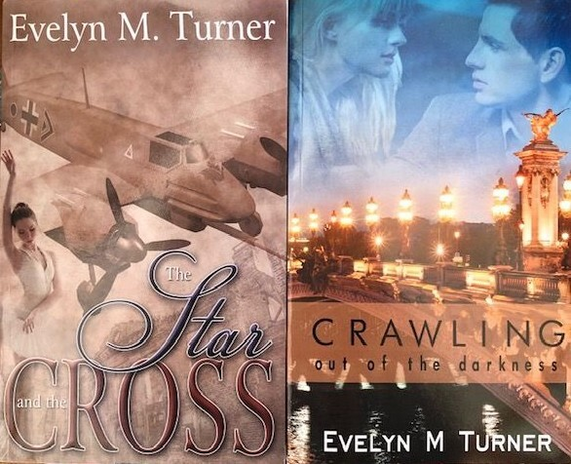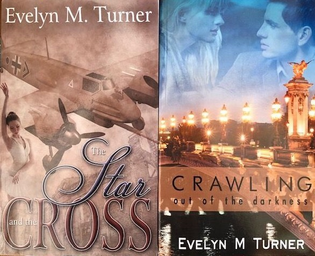Evelyn Turner, author of The Star Cross and Crawling Out of the Darkness, worked for various major airlines doing international flights for 36 years before she began to write her novels. Her two published books are based on true stories revolving around her family who resided in Germany during the time of World War II throughout Nazi occupation. They focus on the family’s role in helping those who were trying to escape Germany and the resulting conflict of the aftermath of the war. The books show how war can change individuals and their outlook on life and see the worst in people as well as the best of humanity.

Her Campus (HC): Was being an author something you always knew you wanted to be or did your passion for writing develop throughout your career?
Evelyn Turner (ET): I always knew I was going to write the first book. I had it in my mind at 15 years old when I was first taken to the cell at the concentration camp that my mother gave birth to my half-sister in and hearing the stories that sometimes were told in hushed whispers. I was truly encouraged to write the second book after my television interview and National Public Radio (NPR) interview. There were many responses of people wanting to know what happened to all the characters in the first story.

HC: What inspired you to write?
ET: Two things inspired me: I was in love with the classics, Wuthering Heights, Elizabeth Barret Browning, Keats. I wanted to create like they did, so my first thought was a children’s book, since I love children and wanted them to be enlightened with the environment, so I wrote Shelley’s Quest. Then, my old college professor and creative writing class encouraged me to finish the first book that I had set aside. I was inspired to set forth with the first novel because I was told by some that the Holocaust never happened. My college professor told me I had to finish the book to show history and truth.
HC: You have two novels currently published. Tell me a little about them and what your writing process is?
ET: My first novel is fiction based on a true story and my second novel is the sequel to the first. My first novel is set from 1939 to 1951 from the beginning of the war in Germany, with my family becoming part of the resistance. They had an MI6 cousin in Britain. My mother (Betty Malloy) was a ballerina and her one brother was a Catholic priest. Being a man of religion, it was a hard mental battle for him to kill in order to save children and to see his sister—my mother—being placed in a concentration camp eight months pregnant because her first husband had turned her in. Her brothers and she all spied against their own country and tried to save as many as they could. They got some out of Germany with false documents and kept others hidden the entirety of the war. The second book deals with the effects on the characters after the war, democracy, communism and the Berlin Wall. We see my mother’s family once again becoming involved with saving people and where they went from the war up until 1964.
My writing process is to first write down all the facts and then research to make sure the dates and events are factual. I even research the smallest details, such as clothing, music, food, etc. I went to concentration camps in Europe, interviewed family members and traveled to those locations in Europe to make sure everything was as closely accurate as possible.

HC: What recommendations do you have for other aspiring authors?
ET: For those who want to write, know your subject matter and do not let anyone discourage you. If you are rejected, just keep sending it out. Make sure you know what that particular agency wants and follow their direction. Start writing small articles for magazines. There are so many avenues now to publish from small companies which can be wonderful. It is not always the big names that give you the best benefit. You can always go the self-publishing route as well, but you will have to market yourself. I would say never give up—put your book to the side and write something else if you feel discouraged, so you can go back to your original with a different perspective. When you send your book out, make sure you send it to the correct company that would handle your writing. Don’t waste their time or yours by not knowing what they want in terms of writing. I heard over and over again when I took creative writing classes: please check for typos. If they see typos, they won’t even look at your work, that is just a fact.
HC: What would you say is the most exciting part of the book-writing process?
ET: I find the research to be amazing. It teaches you things you were not even aware of and fills your mind about what to write and then, of course, you can use your imagination. I love to be descriptive and make you feel as if you are in the book to the point that you don’t want to put it down. I want people to feel the emotion. That is what I love about writing.
HC: Are you planning on taking your novels onto the movie screen?
ET: Yes, we have people looking at it for the screen as we speak.
HC: Are you working on any more books and if so, what are those future projects?
ET: I’m writing my third book which will be the sequel to the second book. It takes place in England and France. So many people wanted me to write a third book about how it all came about, with characters that might not have been built up in the first story, but we will get to know them in the third book better. My fourth book will be about the 36 years of flying I did and what flying was in 1974 up till now. I hope then to go back into children’s books from then on.
Want to see more HCFSU? Be sure to like us on Facebook and follow us on Instagram, Twitter, TikTok, Youtube and Pinterest!



